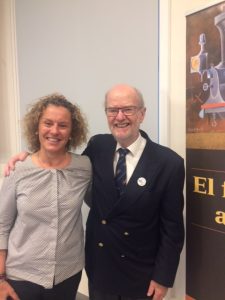Peter Newman, professor at the John Curtin University in Perth, Australia, was responsible for giving the opening conference of the series “Let’s face up to climate change”, organized by the Re-City platform, which will offer twelve conferences by different international experts until May 2019.
The series is promoted by the Catalonia Europe Foundation and the BBVA and the Barcelona City Council.
The opoening conference coincided with the publication of the special report of the UN International Panel on Climate Change (IPCCC), to which Newman belongs. The report warns that global warming of over 1.5ºC could have terrible consequences for the planet and warns of the need to act with “unprecedented measures” to avoid the irreversible damage caused by climate change. Despite the report, the professor was optimistic and hopeful in the conference he gave to a packed auditorium at the Antoni Tàpies Foundation in Barcelona: “I am hopeful that oil consumption can be reduced, and we have good examples, such as in Australia or Denmark, which show that it is possible,” said the Australian professor. “We need disruptive innovation to make cities better. For example, the autonomous vehicle without a driver, if it is not shared, is innovative but is not an improvement for the planet, whereas if shared mobility is applied, it becomes a disruptive innovation.
Newman presented more cases of good practices that are being carried out in other countries, such as Norway or China, where trains without tracks are already being tested, which run on rechargeable batteries and are more stable, less expensive and less polluting than trains or conventional transport.


